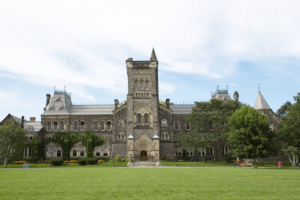Students aspiring to pursue a Masters in Food Technology in Canada have many top-ranked colleges to choose from. It is an advanced degree focusing on health, food production, quality and safety. The students gain detailed knowledge of every step involved in food production, from harvesting to consuming.
It takes inspiration from subject areas, including chemistry, nutrition, chemical engineering and biology. Further, these reputed colleges shape their students to take on jobs of producing healthy and eco-friendly food for the public.
Best Universities for Masters in Food Technology in Canada
The following universities offer Masters in Food Science in Canada at impeccable standards.
| University Name | Qualifying Exam Scores | Course Fee (in CAD)** |
| The University of British Columbia |
| 40,361.33 |
| McGill University |
| 17,772.27 |
| Memorial University of Newfoundland |
| 4,650.69 |
| Dalhousie University |
| 16,609.60 |
| University of Saskatchewan |
| 7,972.61 |
| Western University |
| 24,083.92 |
| University of Guelph |
| 13,453.78 |
The University of British Columbia
Check Your Eligibility for 80+ Universities across Canada
Book a free counselling session and find universities where you can get an Admission!

Check Your Eligibility for 80+ Universities across Canada

Book a free counselling session and find universities where you can get an Admission!
Details of the university and course are described in the table below.
| Particulars | Highlights |
| University Type | Public |
| Year of Establishment | 1908 |
| Course Level | PG Degree |
| Course Name | Master of Food Science |
| Duration | 1 year |
| Fees | CAD 40,361.33 |
Entry requirements for the course are as follows –
- Applicants must hold a minimum score of 65% in the undergraduate course.
- Or, candidates should possess a 4-year Bachelor’s degree with first-division marks or a CGPA of 8 on a 10-point grading system in food science or relevant subjects.
- Further, applicants possess knowledge in any of the following subject areas –
- Organic Chemistry
- Biochemistry
- Calculus, Statistics, Regulations and Quality Assurance
- Physics
- Microbiology and Microorganisms in Food Systems
- Food Process Science
- Food Chemistry
- Food Analysis
- Food Laws and Principles in Food Engineering
- Candidates have to maintain a score of 6.0 throughout each subset of IELTS.
McGill University
Details of the university and course are described in the table below.
| Particulars | Highlights |
| University Type | Public |
| Year of Establishment | 1821 |
| Course Level | PG Degree |
| Course Name | Master of Science (M.Sc.) Human Nutrition |
| Duration | 1.5 to 2 years |
| Fees | CAD 17,772.27 |
Entry requirements for the course are as follows –
- Applicants should hold a 4-year Bachelor’s degree with a CGPA of 3.2 in relevant subject areas. Apart from that, other qualification norms include –
- 3-year Bachelor’s degree from an A-rated institution under NAAC
- A 2-years Master’s degree with a 3-years Bachelor’s degree from an institution rated below A by NAAC
- Applicants with a BSc. Honours in the related field of study
- Applicants must maintain a minimum score of 6.5 on the IELTS exam.
Memorial University of Newfoundland
Details of the university and course are described in the table below.
| Particulars | Highlights |
| University Type | Public |
| Year of Establishment | 1925 |
| Course Level | PG Degree |
| Course Name | Nutrition/Dietetics, MPH |
| Duration | 2 years |
| Fees | CAD 4,650.69 |
Entry requirements for the course are as follows –
- Applicants must hold a minimum average of 75% in the last 2-years of an undergraduate degree program.
- Further, candidates must maintain a certificate in the dietetics course program.
- Applicants must meet the IELTS cut-off requirement of 6.5.
Dalhousie University
Details of the university and course are described in the table below.
| Particulars | Highlights |
| University Type | Public |
| Year of Establishment | 1818 |
| Course Level | PG Degree |
| Course Name | MSc in Food Science and Technology |
| Duration | 1.5 years to 2 years |
| Fees | CAD 16,609.60 |
Entry requirements for the course are as follows –
- Applicants must hold a 4-years Bachelor’s degree from a certified university.
- Must maintain an average CGPA of 3 in the final two years of the graduation program.
- Certificates of thesis-based programs must be accompanied by an undergraduate honours degree. This can be waived by providing substantial evidence of research capacity.
- Further, students with graduation certificates are considered based on their academic performance and ability to research previous qualifications.
University of Saskatchewan
Details of the university and course are described in the table below.
| Particulars | Highlights |
| University Type | Public |
| Year of Establishment | 1907 |
| Course Level | PG Degree |
| Course Name | MSc in Food Science |
| Duration | 2 years |
| Fees | CAD 7,972.61 |
Entry requirements for the course are as follows –
- Applicants must hold a 4-years undergraduate completion certificate from a certified university in the proposed field of study.
- Further, candidates must secure a cumulative grade average of 70%, equivalent to the USask grading system in 60 credit units or the last two years of the previous qualification.
- Must hold scores of a minimum of 6 in each section of the IELTS test.
Western University
Details of the university and course are described in the table below.
| Particulars | Highlights |
| University Type | Public |
| Year of Establishment | 1878 |
| Course Level | PG Degree |
| Course Name | MS in Foods and Nutrition |
| Duration | 2 years |
| Fees | CAD 24,083.92 |
Entry requirements for the course are as follows –
- Applicants with a GPA score of 78% marks in BSc honours in food and nutrition or an equivalent four-year Bachelor’s degree are eligible.
- They should possess prior knowledge in research methodology and statistics with relevant volunteer or full-time work experience.
- Individuals with a minimum score of 8 out of a possible 9 in IELTS are admissible.
University of Guelph
Details of the university and course are described in the table below.
| Particulars | Highlights |
| University Type | Public |
| Year of Establishment | 1964 |
| Course Level | PG Degree |
| Course Name | Food Science, MSc |
| Duration | 2 years |
| Fees | CAD 13,453.78 |
Entry requirements for the course are as follows –
- Students must possess an average score of 73% or above in the last four semesters of the BSc honours course program.
- Applicants must possess a Bachelor’s degree in any of the following subject areas –
- Food Science
- Chemistry
- Biology
- Microbiology
- Physics
- Must maintain a minimum score of 6 in each skill of the IELTS exam.
In addition, studying Masters in Food Technology in Canada can open portals to excellent job prospects. Individuals can land high ranking designations with several reputed MNCs and government agencies involved in food production, quality control and product development. Completing the Master’s program provides an individual with adequate skills to reach new professional career levels. Further, they can improve food production using new innovative methodologies and techniques while maintaining the hygiene factor. Make your Canadian Dream come true by getting the right guidance from Leap Scholar Counsellors.
Frequently Asked Questions
Is Food Technology a good career in Canada?
Yes, a Master’s degree in Food Science and Technology in Canada can get an individual placed in medical, chemical engineering, bioengineering, food production and marketing.
Is the food industry good in Canada?
The food industry in Canada is considered the second largest manufacturing sector in terms of production value. Further, the food industry accounts for 17% of sales through manufacturing and 2% of Canada’s GDP (Gross Domestic Product).
Who can apply for MSc Food Technology?
Students aspiring to study Masters in Food Technology in Canada must have completed a bachelor’s degree from a certified university with an excellent academic record in relevant fields of study. Further, to enrol for MSc in Food technology in a Canadian university one must meet some specific criteria laid down by these institutions. Candidates from non-English speaking countries have to present scores on language tests.
What can I do after MSc in Food Technology?
After completing Masters in Food Science & Technology, door to several high prospect career opportunities, An individual can aspire to become a food technologist, quality manager, nutritional therapist, regulatory affairs officer, and product/process development scientist. Further, they can work as technical brewers, chefs, research scientists, or work for a top MNC involved in food production and management.






